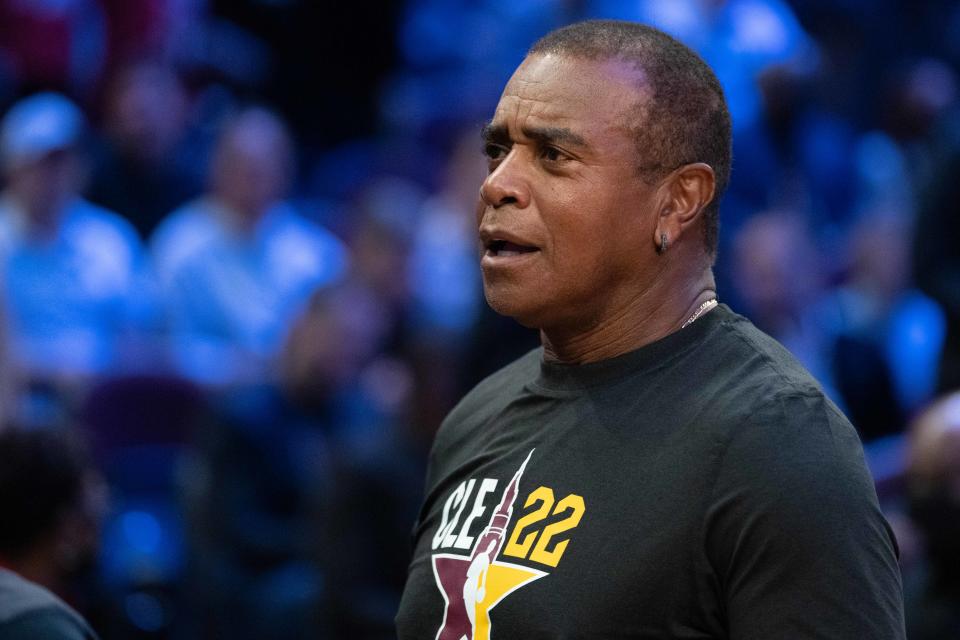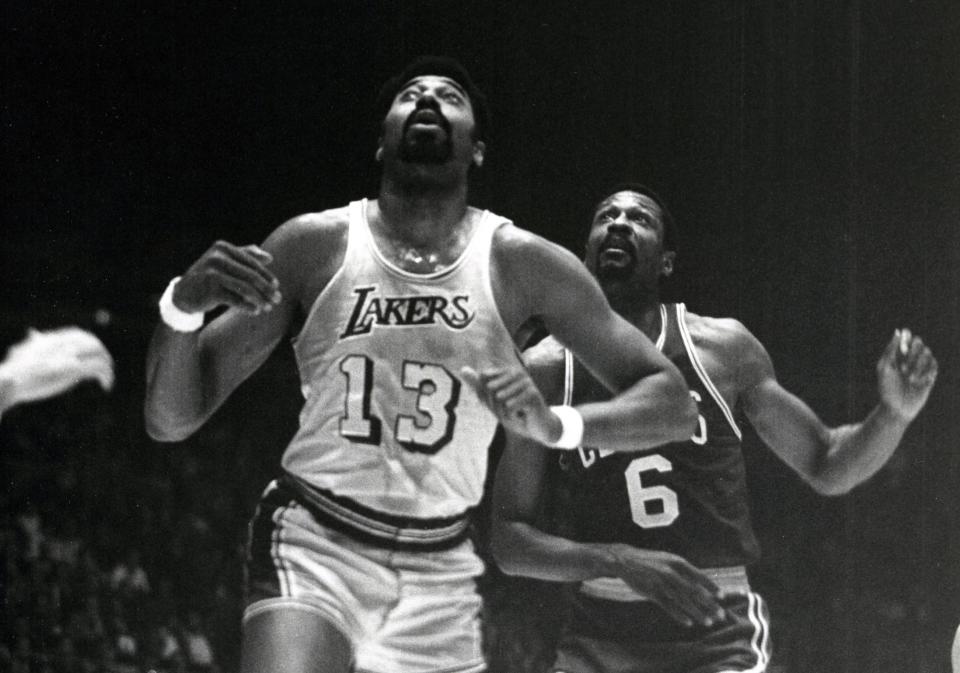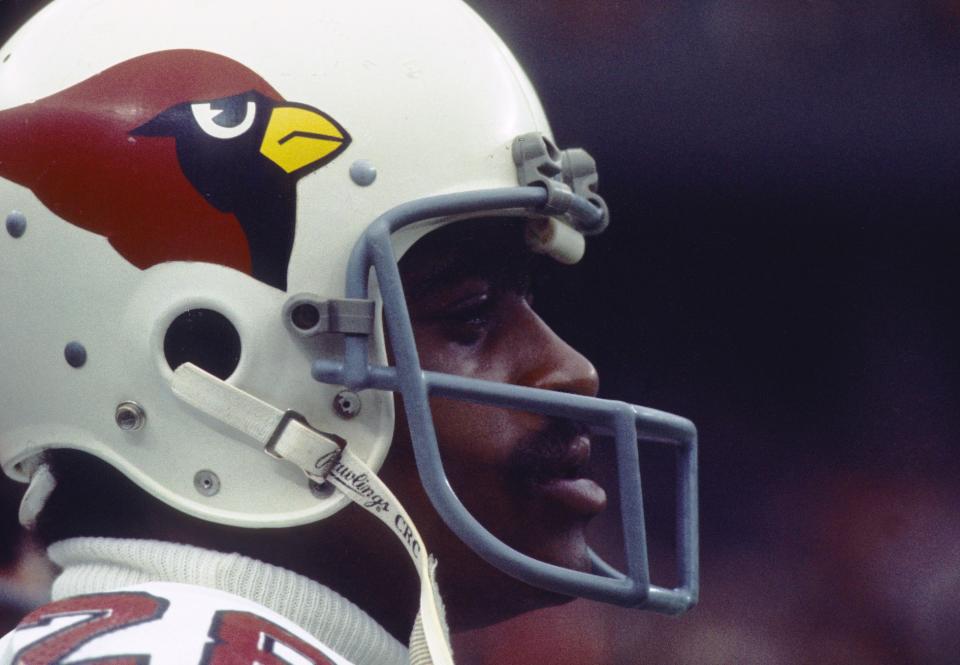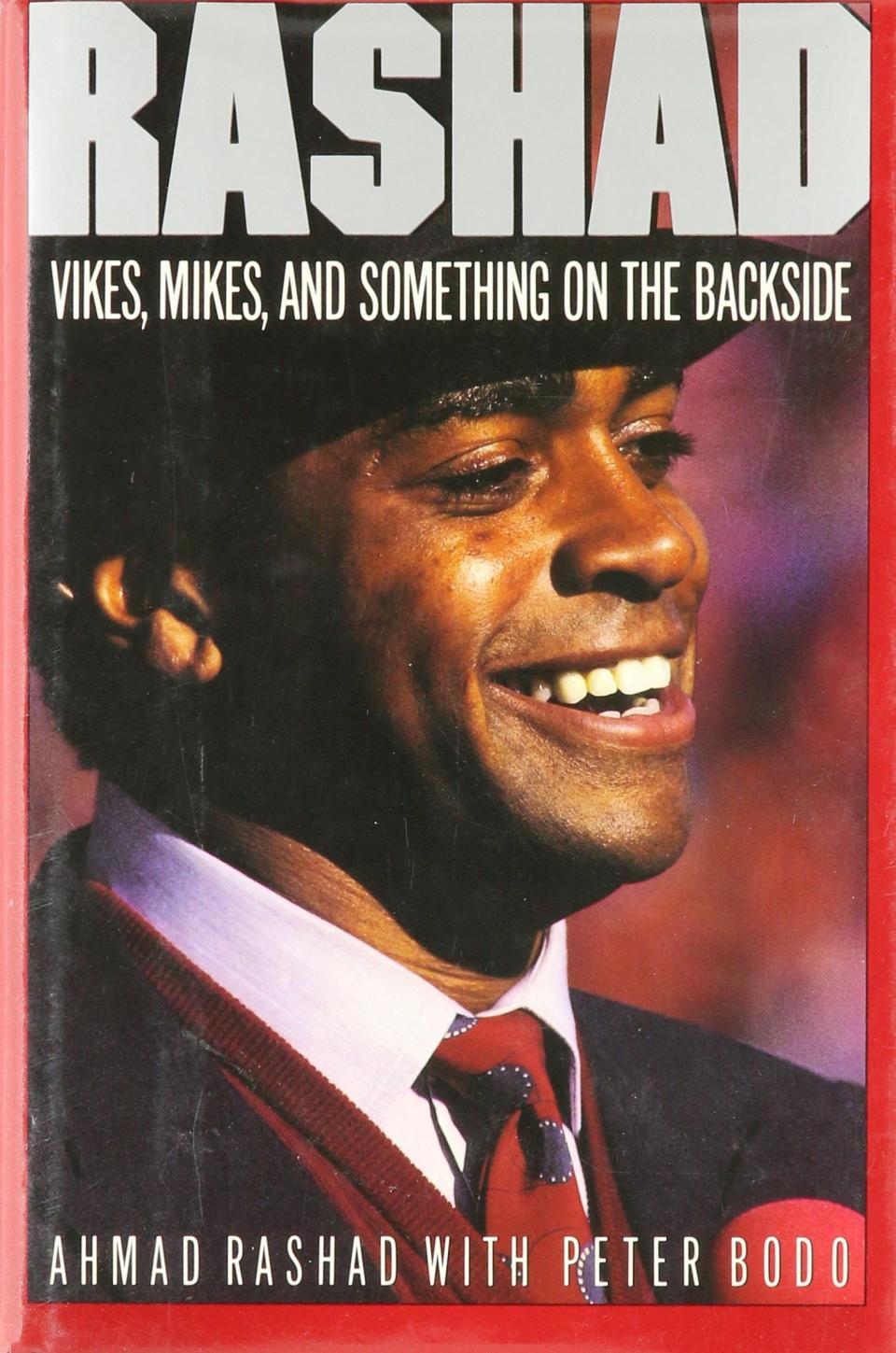Ahmad Rashad Q&A: ‘Basketball today is as good as it’s ever been’

For anyone who became a fan of the National Basketball Association in the 90s, the name Ahmad Rashad is closer to Holy than a mere entertainer. Rashad was the host of NBA Inside Stuff for the entire decade and into the 2000s, captivating fans with his joy and chemistry with seemingly every NBA star, from Michael Jordan to Muggsy Bogues. But before he was a mainstay on Saturday morning television, Rashad was an NFL star.
Born and raised in the Pacific Northwest, Rashad went to the University of Oregon and was drafted fourth overall in 1972. He later became a four-time Pro Bowl selection with the Minnesota Vikings. He was also married to the dazzling actress Phylicia Rashad. Rashad, who is known for his close relationships with the likes of Jordan, Charles Barkley, Patrick Ewing and others, has recently jumped back into the NBA television scene with the new show, NBA Rewind, available on the league’s app. We caught up with the iconic broadcaster to ask him about this new endeavor and to take a stroll down memory lane.
The viral moment at the NBA Tech Summit... Were you as surprised at the outcome of Adam Silver’s demonstration as everybody else was? What was that like for you and your now infamous purple shirt?
Ahmad Rashad: [Laughs] Well, I wasn’t as surprised because, you know, I was in on it. I had to go out to L.A. to film all that. So, I already knew that was coming up. But I hadn’t seen it before. I hadn’t seen it. I just saw – when I had to go out and film some things and do some stuff with a camera. They had, like, 25 different views on it and all those kinds of things. And then I didn’t see it until the All-Star Game. It was pretty cool! The thing is that Adam comes up with something like that every single year. Every single Tech Summit, there’s new stuff and it’s just incredible how things have gone from the first Tech Summit to this one.
It seems like a big priority for the league, in a way, to have these wow moments.
AR: Yeah, it really is. It’s one of those things where they have the top of the people in the business, in the direction that we’re going. You’re always looking 10-15 years ahead in what’s going to happen during that period of time. And you realize how it’s all over the world. It’s not just where we’re sitting. It’s everywhere.
You are a big reason for the league’s growth. Inside Stuff brought in so many fans, so many young fans. Just broadly, what do you love most about the NBA? Why do you think you connected so well with the league?
AR: I’ve always loved basketball. Basketball is a thing – it’s my second favorite sport, if not my first favorite sport. I just happened to be a better football player than I was a basketball player. But I was always – basketball was a thing for me. But when you think about basketball, it affects people all over the world. It’s a game that’s being played all over the world. It’s a wonderful game of learning how to deal with people, how to be part of a team. Have 15, 17 people all get together and try to do things the correct way.
What did the success of Inside Stuff indicate to you about yourself, the league or even the show’s format? It was beloved by so many.

Jed Jacobsohn /Getty Images
AR: It was an opportunity for the audience to see the players as they are. To not just see the guy dunking and taking shots and being a great dribbler. But to see where that guy came from. Where did all that come from? How did you get from wherever you grew up to now. And there were so many stories to be told! And I think that’s what I liked. I really enjoyed finding out about these guys. I didn’t just want to see them in a uniform. I wanted to know, “Hey, have you ever been to the mall?” “Who goes to the grocery store for you?”
Just to make you normal. I want you to be normal, because you are normal. It’s just the fact that you play this game so well. So, I think people really enjoyed not only getting a chance to pick and choose their favorite player. But getting a chance to see them on Inside Stuff on Saturday, hanging out with me and Willow. It was one of those kinds of things where I felt, they just couldn’t get enough. And the thing that has changed now with the Internet, you got everything you can imagine. Then it was just Inside Stuff that was giving you the inside stuff every weekend. Because I don’t think a day goes by in my life that somebody doesn’t walk up to me in the street and say, “I grew up watching that show every Saturday.” Not one day goes by.
Sometimes I wonder if we do have the same window into our favorite players as we did with Inside Stuff and some of those great Rising Stars VHS tapes. I know there’s a lot out there but it’s not quite the same. Is that the inspiration behind your new show NBA Rewind?
AR: I thought that we did something different. You know, rather than all the stuff that you’ve seen. And I still think that that hasn’t been repeated. That show that we did, Inside Stuff, has not been repeated. It hasn’t gotten as close. As you look at some of the shows that we’re doing [with NBA Rewind], the Steph Curry it wasn’t an interview with Steph, it was a conversation. About life, about where he came from. He wasn’t the No. 1 draft guy or the one who had all these college scholarships coming out of high school. So, he wasn’t that at all. And to hear the story about how he became—right now he’s the best shooting guard in the history of the game.
But how did he get to that? And did that change you. Or what gave you the ability to get knocked down and keep going. Which is the beauty of sport. It’s what it teaches you. That if you get knocked down, you got to get up and keep going. Those are the kinds of lessons that you learn that really work for you in life. So, those are the things you take on with you. So, it’s kind of interesting to watch guys like that. To sit up in a conversation and be very open about how it happened, how they feel about it, how important it’s been to them in their life. That’s what I try to do. That’s what this new show is about.
It’s about really learning who the people are. It’s not just for has-beens. It’s also for the stars that are stars now. I talk to Joel Embiid. We have a show coming up with him. And it’s just incredible to me to even think of. Think about if you started doing something when you were 15. That’s when you picked it up. Then 10 years later, you were the best in the world at it. That’s almost – that blows my mind. That’s unbelievable. And he hasn’t even hit his threshold. He’s still getting better.
Well, that’s a bit like you with broadcasting

George Rose/Getty Images
AR: Well, the only thing about broadcasting. I started doing broadcasting early on. It wasn’t like I just jumped on. I worked full-time while I played for the Minnesota Vikings. I worked full-time for a CBS affiliate in Minneapolis. And I did every single sport. So, I did that for five years before I retired from football and went to the network and I also could produce my own stuff, I wrote my own stuff. So, it wasn’t like, “Oh, hey, here’s this football player that now all of a sudden he’s doing this.” That’s not the way it went. I was cutting my teeth early on. I had three shows a week on while I was still playing football for the Vikings. And every sport. Basketball, hockey, track and field, all those kinds of things.
And then when I got to NBC – well, I had a chance to go to all the networks, ABC, CBS, NBC. ABC and CBS just wanted me to do football. I didn’t want to do just football, because I was in this for a job. Not just to be the latest All Pro that comes in and does things and then two years you get rid of him and get another All Pro. I was in for the long haul. Because all the shows that I did, I was the producer of it. So when I got to NBC, they let me do everything. I did four Olympics, I did track and field, I did everything. I did NASCAR. I did all of that stuff. The Saturday shows were rewind shows of the whole week and what’s going on that time.
When I left football and I went to NBC, my goal was to do television so well that people would forget me as a football player. I didn’t think that could happen. Like, there’s no way that could happen. Shit, I made the Pro Bowl, I was All Pro four years in a row. All that kind of stuff. I figured it would be hard to do. But lo and behold! There are so many people now that I run into who have no idea that I played football. So, maybe I might have done that too well!
You have the advantage of looking at the game and it’s participants so closely for several decades. What is the biggest difference between the game in the 90s and now?
AR: Well, the league I think has become more exciting. There’s a lot more shooting, the three-point shot is back involved, there’s more fans, it’s just – it’s more. It’s a wonderful, wonderful sport that has grown to the point where it’s huge and it still continues to grow around the world.
It’s a very entertaining sport and I think it’s being brought to you with all these different angles. Which gives you sort of a way of looking at it from a lot of different positions. Also, the players can go on the Internet and write and say what they want to say. During the Inside Stuff time, we were the only place you could come to and we’d blow people out. I’d go to games and guys would run by me and go, “Hey, man, when am I going to be on Inside Stuff? How come I’m not on Inside Stuff?” This is what would happen back in those days. Well, now, guys can have their own Inside Stuff, with their own website!
You famously had close relationships with people like Patrick Ewing and Michael Jordan. To what do you attribute that closeness, that chemistry?

Neil Miller-Pool/Getty Images
AR: Well, the relationship was that I was, you know, respected as being an athlete. So, I was in that spotlight as a player myself. So I was never surprised by anything. Or how your life changes the bigger star you become as an athlete. I’d already gone through those kinds of things. So, these guys were fans of mine also. Between Michael and Patrick and Charles and all these guys. They knew me as an All Pro football player. So, there was a common thread between our relationship.
And it created a very open relationship between us. It was like, I already know the answer to the question that I’m asking you. [Laughs] I already know the answer, I just want to hear you say it! It was those kinds of things – I’d been in that seat before. And it wasn’t the same seat. It wasn’t a seat like I barely played. That wasn’t it at all. I was pretty good at what I did. So, we had those common denominators in terms of our relationships. Pro football player, pro basketball player. And now you’re still a basketball player and I’m a journalist.
You grew up in Tacoma, Washington, outside of Seattle. When were you first introduced to sports? And what are your feelings on the Seattle SuperSonics?

Darryl Norenberg-USA TODAY Sports
AR: You know who I talked to last night? Fred Brown. [SuperSonic great] Downtown Freddie Brown. I got in an argument with somebody about the Seahawks and I ended up calling him on the phone. When I was growing up in Tacoma, the Sonics had a PR guy that used to be the PR guy at [the University of] Oregon. So, when they were recruiting me, I got tickets to the Sonics, all the Sonics games. And they were right down on the court. So, I would always go to those games and then when Bill Russell was there, Bill Russell and I became very good friends. Because I was like a hotshot athlete that was trying to decide what school I wanted to go to and what I was trying to do with my life and all this kind of stuff.
He was one of the guys who would always call me and say, “How you doing? What’s going on? What are you thinking about? How about this? Where are you going to go to school?” It was all those things. That’s kind of the way my thing with basketball sort of came around. Bill ended up being one of my dearest friends and always the guy if I needed some advice or wanted to do something, he was the guy I could call. Or I’d go over to his house, and we’d hang. And I became very good friends with Freddie Brown. I got hurt and sat out a year [in the NFL] and I did my rehab at the Sonics’ place. With their trainer. Just because I knew all the guys. And I used to go to all the games, every single game.
So that’s kind of the way the basketball thing came to me. But like I said, even getting involved in that business, when I started doing basketball, even when I was doing the Olympics, Wilt Chamberlain became a very good friend of mine. I just ran into him – I was on my way to Helsinki, Finland one time for the World Championships of track and field and I was standing in the airport. A guy walks up to me and says, “Whatever you do, don’t ask me how the weather is up here.” And I turned around and it was Wilt Chamberlain. Now Chamberlain was a huge track fan. So, for the next two weeks he sat next to me every single night when I went to work. Because I was doing field events, like the discus and the shotput and all those kinds of things. He would tell me each player, what they were doing, each athlete, he was so knowledgeable about this entire thing.
So, we became great friends from there. And ended up going to track meets all over the world. It was a weird – I don’t know if I can explain all that. Even now that I’m saying it, it’s like, wow. That’s pretty cool. But it’s normal! So, he ended up being my stat guy over the course of Helsinki. But we’d also go to track meets and we’d bet on who’s going to be leading coming out of the turn, who’s going to be the first – it just was a wonderful time. And as I say, not only was it me. Wilt knew who I was in terms of football. So, it was an easier connection. It was a big fraternity and things get kind of put together that way.
Anything Bill Russell said to you and sticks out today?
AR: No, there’s no mantras or anything like that. It’s just Bill was a very dear friend. Anytime I had anything to talk to him about, we’d talk about it. But it was always being excellent in life. Just the same way you were excellent on the field. He was always saying that. “The same effort you put in to do this is the same effort that you’ve got to put into your life to make that work.” So, those were the kinds of things. And he was like a big brother.
Football. You were a four-time Pro Bowler in the NFL. How often do you think about that part of your life? And when you do what comes to mind?

Herb Weitman-USA TODAY Sports
AR: I think that sport is very important with the sort of effort that you put into your life, you know? That’s the things that you take with you. Being so competitive. It’s something that you sort of, when you stop playing, you have to sort of back down on it a little bit, because it’s not – you can’t yell at anybody or do anything like that! [Laughs] It does change! But it’s the beauty of sport. And when I think about football, yeah I still see guys that I played with or played against, and that fraternity always stands.
Can I ask one question about your daughter Condola Phylea Rashād, who’s a very talented actor on stage and screen. When you think about her career, what comes to mind?

Roy Rochlin/Getty Images
AR: Well, her mom is a pretty good actress, too! And she was a good athlete, too. She liked to run track, and everything. And she was so kind. She was a high jumper. She ran the 100 and all those kinds of things. And I can remember her in high school, where you’re high jumping against other people. The people she was jumping against were having a hard time making the height! And she would, if her opponent missed, she would go over to the opponent and go, “Come on, you can really do it! All you got to do is this, that.” And I’m going, “I don’t think that’s what you’re supposed to do. You’re supposed to hope they miss, I think?” And she was like, “No, dad, they’re such a wonderful person!”
So, she’s a beautiful, beautiful girl and just a great competitor and a wonderful actress. Oh and let me tell you this one about her, while we’re talking about my daughter. My daughter comes back from school one day, she’s like in sixth or seventh grade. And she goes, “Hey, dad, there’s a guy at school that said you played for the Minnesota Vikings. Did you? He wants your autograph! Did you play for the Minnesota Vikings?” That’s when she was about 13, 14 years old. It was like, did I? Yeah I did! We got trophies hanging up around the house! [Laughs] But I always got such a big kick out of that.
Truly, you’ve lived several lives. But I notice, being the sleuth that I am, that you don’t have a memoir out. At least not one since 1988. I wonder why that is?
AR: Well, I don’t know. Sometimes I still think that life is about living. And looking forward, not backwards. But every now and then you can look back, and it’s kind of fun to do these things. But where it works is forward. I’m still going forward. I don’t think I’ve slowed down that much. But there are certain things that surprise me, when I start talking about stuff. Like, Wow I did that? Or I was at that? My older daughter was talking about it the other day. It’s like, I don’t know. I don’t know. I’ve had a blessed life. I’ve really been blessed.
That’s the title! Okay, who are you looking at in this year’s playoffs. Who do you have going forward?
AR: You know what? I watch everybody. I love the drama. I love the fact that there’s this new play-in thing, too. Because it gives everybody a chance. In sports, it’s about the fans. It’s about them getting fired up and everybody having a chance at the championship and a chance to work their way into it. I like that there’s not really any teams that run over anybody. Nobody can say, “Yeah, that team’s going to win the championship.” That’s wonderful! That brings all these cities and all these teams and all these fans into a place where we’re all excited about our teams and we’re going to find out who really is the best. So, I think basketball has just gotten better and better. And it’s as good as it’s ever been today with all the scoring, all the players, and I’ll never get over that 120 international players. That’s just incredible.
What do you love most about what you’ve been able to do in your life and career? Is there a single thing that would be in the first room of the Ahmad Rashad Museum?
AR: Waking up is pretty cool! [Laughs]. You know, I think waking up is pretty cool. You never know what’s around the corner. My father always taught me to be forever curious. Like, what’s over there? Or what’s down the street? Why are they doing – so, I still have that same feeling of, What’s over here? What’s next? Rather than, hey remember 10 years ago when such and such happened? There’s a place for that, but it’s just I don’t have a lot of room for it yet. Maybe when I get to be, like, 80 or 90 or something! Or, I don’t know. But it’s just, I don’t know if I would be ready to look back yet. I don’t mind doing it with you and us talking here. But what’s really on my mind is maybe the next show that we’re going to do for NBA Rewind.
You can follow Jake Uitti on Twitter @jakeuitti. You can buy his Muggsy Bogues biography here.


